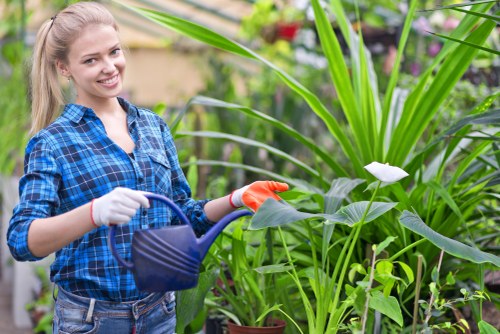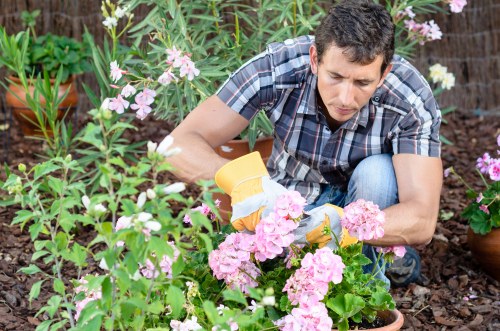Driveway Algae Removal in Stanmore: Keep Your Driveway Clean and Safe

Are you noticing unsightly green patches on your driveway in Stanmore? Algae growth can not only make your driveway look bad but also become slippery and hazardous. Understanding how to effectively remove algae and prevent its return is essential for maintaining both the appearance and safety of your property.
Algae thrive in damp, shaded environments, making driveways a perfect spot, especially after the rainy season. Fortunately, with the right approach and tools, you can remove algae from your driveway and keep it looking pristine all year round.
In this article, we will explore various methods for driveway algae removal in Stanmore, discuss preventive measures, and highlight the benefits of professional services. Whether you're dealing with minor stains or extensive growth, this guide will help you restore your driveway's beauty.
Understanding Algae Growth on Driveways

Algae are simple, plant-like organisms that thrive in moist environments. They reproduce quickly, especially in areas with limited sunlight and high humidity. On driveways, algae can cause discoloration, making the surface look dull and unattractive.
Besides aesthetics, algae can make your driveway slippery when wet, posing a safety risk for pedestrians and vehicles. Ignoring algae growth can lead to bigger problems, including surface degradation over time.
Identifying the type of algae is crucial for effective removal. The most common types found on driveways include **green algae**, **black algae**, and **red algae**. Each type may require different treatment methods to ensure complete removal.
Signs of Algae Growth
Recognizing algae on your driveway early can save you time and effort in the long run. Common signs include:
- Green or black discoloration on concrete or asphalt surfaces
- Slippery patches, especially after rain
- Stains that are difficult to remove with standard cleaning methods
- A musty or damp smell around the affected area
Effective Methods for Removing Algae

There are several ways to tackle algae on your driveway, ranging from DIY solutions to professional treatments. Here are the most effective methods:
1. Pressure Washing
Pressure washing is one of the most efficient ways to remove algae. The high-pressure water jets can effectively strip away the algae from the driveway surface.
However, it's important to use the right pressure level to avoid damaging the driveway material. For concrete driveways, a pressure of around 3000 PSI is recommended, while asphalt driveways may require a lower pressure.
2. Chemical Cleaners
Chemical algae removers can break down the algae and make it easier to wash away. Look for products that are specifically designed for algae removal and are safe for use on your driveway material.
Common ingredients in these cleaners include bleach, vinegar, and specialized algae-killing agents. Always follow the manufacturer's instructions and take necessary safety precautions.
3. Vinegar Solution
If you prefer a natural approach, a vinegar solution can be effective against algae. Mix equal parts of white vinegar and water and apply it to the affected areas.
Let it sit for about 15-20 minutes before scrubbing with a stiff brush and rinsing with water. Vinegar is a non-toxic and environmentally friendly option for algae removal.
Natural Remedies for Algae Removal
For those who are environmentally conscious, natural remedies offer a safe alternative to chemical cleaners. Here are some effective natural solutions:
- Baking Soda: Sprinkle baking soda on the algae patches, then scrub with a brush. Baking soda's abrasive nature helps remove the algae without harming the driveway surface.
- Lemon Juice: The acidity in lemon juice can kill algae. Apply freshly squeezed lemon juice to the affected area, let it sit for 10 minutes, then rinse off with water.
- Borax: A mixture of borax and water can be used to scrub away algae. Borax is a natural mineral that effectively eliminates algae growth.
Preventive Measures to Keep Algae at Bay

Prevention is always better than cure. Implementing preventive measures can help you avoid the hassle of algae removal in the future.
Here are some tips to prevent algae growth on your driveway:
- Improve Drainage: Ensure that your driveway has proper drainage to prevent water from pooling. This reduces the moisture that algae need to grow.
- Increase Sunlight Exposure: Trim any overhanging branches or shrubs that block sunlight. Algae thrive in shaded areas, so more sunlight can inhibit their growth.
- Seal Your Driveway: Applying a high-quality driveway sealant can create a protective barrier against moisture and algae. Sealants also make it easier to clean algae if it does appear.
- Regular Maintenance: Regularly sweep and wash your driveway to remove dirt and debris that can hold moisture and promote algae growth.
Choosing the Right Sealant
Selecting the appropriate sealant for your driveway is crucial in preventing algae. There are different types of sealants available:
- Penetrating Sealers: These sealers soak into the driveway surface, providing protection from within. They are ideal for concrete driveways and offer long-lasting defense against moisture.
- Acrylic Sealers: Acrylic sealers form a protective layer on the surface. They enhance the color of the driveway and provide a glossy finish, which helps repel algae and moss.
- Silane/Siloxane Sealers: These are advanced sealers that offer both surface and penetrating protection. They are highly effective in preventing algae growth and are suitable for various driveway materials.
When to Call Professionals

While DIY methods are effective for minor algae growth, extensive or stubborn algae may require professional assistance. Professionals have access to specialized equipment and eco-friendly cleaners that can thoroughly eliminate algae.
Hiring a professional driveway cleaning service in Stanmore ensures that the job is done safely and efficiently. They can also provide valuable advice on preventing future algae growth and maintaining your driveway's appearance.
Consider reaching out to a local expert if:
- The algae covers a large area of your driveway
- DIY methods are not effective
- Your driveway material is delicate and requires specialized care
Benefits of Professional Algae Removal
Professional services offer several advantages:
- Expertise: Professionals understand the best methods and products for different driveway types.
- Time-Saving: They can complete the cleaning process quickly, saving you valuable time.
- Long-Term Protection: Many services offer sealing options that provide ongoing protection against algae and other contaminants.
- Safety: Professionals use safe and effective products, minimizing the risk of damage to your driveway or the environment.
Cost of Driveway Algae Removal in Stanmore
The cost of algae removal can vary depending on the size of your driveway, the extent of the algae growth, and the method you choose. DIY methods are generally more affordable, with costs primarily related to cleaning supplies and equipment rental.
Professional driveway cleaning services in Stanmore typically charge based on the size of the driveway and the level of cleaning required. On average, you can expect to pay between $150 and $300 for professional algae removal. However, prices may vary, so it's advisable to get quotes from multiple providers.
Investing in professional services can save you time and ensure a thorough clean, making it a worthwhile expense for many homeowners.
Factors Influencing the Cost
Several factors can affect the overall cost of algae removal:
- Driveway Size: Larger driveways require more time and materials, increasing the cost.
- Degree of Algae Growth: Severe algae infestations may need more intensive treatments.
- Driveway Material: Different materials may require specific cleaning methods or products.
- Additional Services: Services like sealing, repairs, or additional cleaning may add to the cost.
Environmental Considerations

When removing algae from your driveway, it's important to consider the environmental impact of the methods and products you use. Opting for eco-friendly solutions can help protect the surrounding environment and promote sustainable practices.
Many commercial algae removers contain harsh chemicals that can be harmful to plants, animals, and water sources. To minimize environmental harm, consider using natural alternatives like vinegar, baking soda, or borax.
Additionally, proper disposal of cleaning runoff is essential. Avoid letting dirty water seep into storm drains or nearby vegetation, as this can spread contaminants.
Eco-Friendly Cleaning Solutions
Here are some environmentally friendly options for algae removal:
- Vinegar: As mentioned earlier, vinegar is a natural and safe option for killing algae.
- Baking Soda: Its abrasive properties help remove algae without introducing harmful substances into the environment.
- Hydrogen Peroxide: This is a safe alternative that effectively kills algae and breaks down into water and oxygen.
- Enzyme Cleaners: These cleaners use natural enzymes to break down algae and other organic matter.
Maintaining a Clean Driveway
Keeping your driveway algae-free requires regular maintenance. Here are some tips to maintain a clean and safe driveway:
- Regular Cleaning: Sweep your driveway regularly to remove debris and prevent moisture accumulation.
- Prompt Repairs: Fix any cracks or damage in your driveway promptly to prevent algae from finding safe havens to grow.
- Proper Drainage: Ensure that water drains away from your driveway to reduce moisture levels.
- Seasonal Sealing: Apply a sealant at least once a year to provide ongoing protection against moisture and algae.
Routine Inspection
Inspect your driveway periodically for any signs of algae growth, cracks, or other damage. Early detection allows for quick action, making maintenance easier and more effective.
By staying proactive, you can extend the lifespan of your driveway and maintain its aesthetic appeal.
Local Expertise: Driveway Algae Removal in Stanmore's Surrounding Areas
Stanmore is surrounded by several neighboring areas that also experience similar algae-related challenges. Professionals servicing Stanmore often cater to these nearby regions, ensuring comprehensive coverage and expertise.
- Cherrybrook: Just a short distance from Stanmore, Cherrybrook residents benefit from specialized algae removal services that cater to both residential and commercial properties.
- Beecroft: Known for its lush gardens, Beecroft needs effective algae removal to maintain beautiful driveways amidst abundant greenery.
- Bass Hill: With its busy streets and varied driveway materials, Bass Hill requires versatile algae removal solutions.
- North Ryde: North Ryde's diverse community benefits from professional algae cleaning, ensuring driveways remain safe and attractive.
- West Ryde: West Ryde's proximity to Stanmore makes it an ideal area for accessing expert driveway cleaning services.
- West Pennant Hills: Residents here often seek reliable algae removal to complement their well-maintained homes.
- Beaumont Hills: Beaumont Hills enjoys clean driveways thanks to efficient and environmentally friendly algae removal methods.
- Galston: Galston's unique climate conditions make regular algae maintenance essential for driveway upkeep.
- Castle Hill: Castle Hill's expansive properties utilize professional services to keep algae at bay.
- Hornsby: Nearby Hornsby users appreciate the comprehensive services offered by Stanmore algae removal experts.
- Arcadia: Arcadia's scenic driveways receive expert care to ensure algae does not detract from their beauty.
- Normanhurst: Normanhurst benefits from the advanced techniques used by Stanmore professionals to remove stubborn algae.
- Eastwood: Eastwood residents rely on prompt and effective algae removal to maintain their driveways year-round.
- Epping: Epping's extensive driveway networks are well-maintained through regular algae cleaning services.
Conclusion
Driveway algae can be a persistent problem in Stanmore and its surrounding areas, but with the right approach, it can be effectively managed and prevented. Whether you choose to tackle the issue yourself or hire a professional service, maintaining a clean driveway enhances your property's appearance and safety.
Investing in regular maintenance, improving drainage, and sealing your driveway are proactive steps that can save you time and money in the long run. Additionally, being environmentally conscious in your cleaning methods ensures the well-being of your local ecosystem.
Don't let algae compromise the beauty and functionality of your driveway. Take action today to keep your Stanmore driveway looking its best.
Frequently Asked Questions
1. What causes algae to grow on driveways?
Algae thrive in moist, shaded environments with limited sunlight. Driveways that are frequently exposed to water, such as those near gardens or with poor drainage, are more susceptible to algae growth.
2. Can algae on driveways damage the surface?
Yes, over time, algae can make surfaces slippery and contribute to the degradation of the driveway material, leading to cracks and other damage.
3. How often should I clean my driveway to prevent algae?
It's recommended to clean your driveway at least once a year. Regular maintenance, such as sweeping and promptly addressing stains, can help prevent algae growth.
4. Are there eco-friendly methods for removing algae?
Absolutely. Natural remedies like vinegar, baking soda, lemon juice, and hydrogen peroxide are effective and environmentally friendly options for algae removal.
5. When should I consider hiring a professional for algae removal?
If the algae covers a large area, persists despite DIY efforts, or if your driveway material is delicate, it's best to hire a professional to ensure effective and safe removal.


